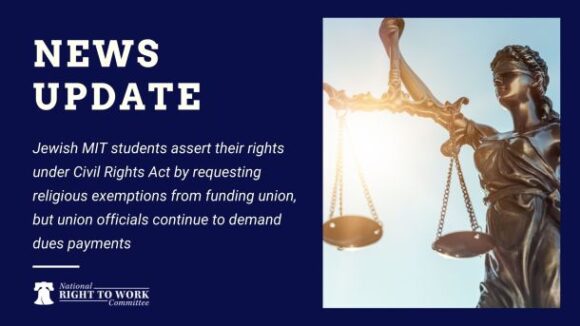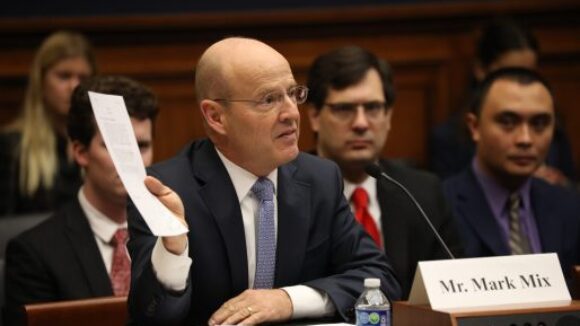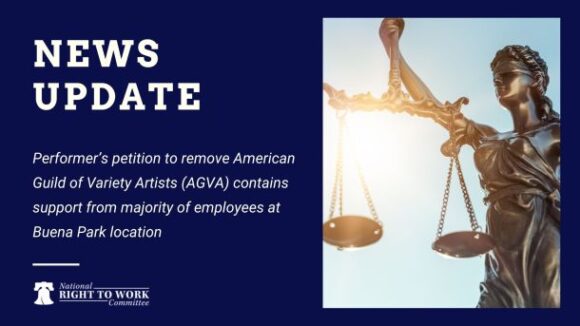1. Freedom to Associate Also Means Freedom Not to Associate
2. Right to Work Bolsters Job Creation, Personal Income Growth
3. Right to Work’s Benefits Reach Citizens at All Income Levels
4. Without a Right to Work Law, It Is Basically Impossible To Prevent Forced-Dues Politicking by Union Bosses
5. Right to Work Laws Deter Union Corruption
1. Freedom to Associate Also Means Freedom Not to Associate — The average man on the street understands, as well as constitutional scholars do, that any genuine personal right should include the freedom to refrain from exercising that right. But federal labor law, like many state laws that are modeled after it, doesn’t protect employees’ freedom in the commonly accepted sense of the word. It recognizes the right to join a labor union, but does almost nothing to protect those who don’t want labor union affiliation.
2. Right to Work Bolsters Job Creation, Personal Income Growth — In addition to freeing an estimated 576,000 workers who are currently forced to pay union dues as a condition of employment, a Michigan Right to Work law would be good for the state economy. Study after study shows that the 23 states that have passed Right to Work laws have a huge advantage in creating jobs and expanding their economies. Because independent-minded employees have the power to penalize Big Labor’s irresponsible class-warfare tactics by resigning from a union and withholding their dues, in Right to Work states union bosses must rein in their militancy.
3. Right to Work’s Benefits Reach Citizens at All Income Levels — In addition to protecting the freedom of association and promoting economic development, a Michigan Right to Work law would be an anti-poverty program with a proven record of success. Economists of all political stripes know that a buoyant employment market is especially beneficial to job-seekers who are striving to pull themselves and their families out of poverty. In a more vibrant economy, those just entering the work force find jobs more quickly and can command higher wages when they do. Therefore, it’s not surprising that a far larger share of citizens in compulsory-unionism states must depend on federal welfare payments to get by than in Right to Work states.
4. Without a Right to Work Law, It Is Basically Impossible To Prevent Forced-Dues Politicking by Union Bosses — If Michigan’s Legislature enacts a Right to Work law, Michigan workers and other citizens will have a brighter economic future. But that’s not all. It will also ensureMichiganworkers have a practicable right to refuse to contribute to political candidates they do not wish to support. Every election year, forced union dues and “agency” fees finance phone banks, get-out-the-vote drives, and “volunteer” campaign organizing work by union staff who remain on the union payroll. The fact is that union bosses’ direct PAC contributions to candidates are just the tip of the iceberg.
5. Right to Work Laws Deter Union Corruption — The incestuous relationship between forced union dues and corruption was captured perfectly by the late U.S. Sen. John McClellan (D-Ark.): “Compulsory unionism and corruption go hand in hand.” McClellan was referring to the corruption inherent within labor organizations that depend on the forced tribute of workers. Compulsory dues foster not only the misuse of union treasury funds for political purposes, but also union embezzlement, extortion, bribery, and bid-rigging. Since the late 1990’s, seven international union presidents have been forced out of office after being implicated in felonies. And, according to the U.S. Labor Department’s union-fraud unit, in Fiscal 2008 alone its investigations resulted in more than 100 convictions of corrupt union officials and their cohorts, primarily on charges related to embezzlement of workers’ forced union dues and fees. However, “only a small percent of these crimes are detected,” according to LaVern Duffy, former general counsel for the U.S. Senate Permanent Subcommittee on Investigations.



